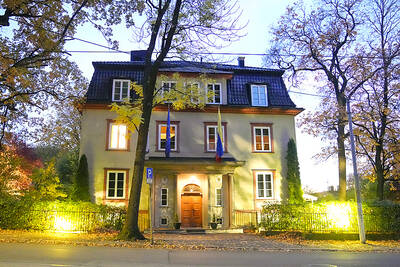Peruvian President Alan Garcia apologized to poor Peruvians for failing to improve their lives during his first year in office, and vowed renewed efforts against poverty.
Garcia, one of Washington's closest allies in Latin America, has presided over an economic boom driven by high world metal prices, but his popularity has slipped as the poor grow frustrated at being left out of the bonanza.
"I would have loved to do a lot more," Garcia said in his nationally broadcast state of the nation address to Congress, acknowledging that his government had not worked fast enough to help the poorest Peruvians.
"We apologize for this," Garcia said to thunderous applause.
He said increased public investment will "change the social face of Peru" by slashing the poverty rate to 30 percent from 44 percent now, and said the government would build housing for 1.2 million Peruvians by the time his term ends in 2011.
Garcia took office eager to redeem himself after a disastrous first government in the 1980s -- marked by radical populist rhetoric -- that left Peru mired in hyperinflation and nearly bankrupt.
Peru's economy grew 8 percent last year, the eighth consecutive year of expansion for the Andean nation of 27 million people, and Garcia has pushed forward with his market-friendly agenda.
But this month, peasant farmers, unionists and teachers took to the streets in sometimes violent demonstrations, blocking roads and closing airports to press for better distribution of wealth.
"In our situation of growth in the midst of great poverty, deep inequality and terrible distribution of wealth, a certain level of tension, protest and conflict is unavoidable," political analyst Gustavo Gorriti noted recently.
Resentment toward Garcia, 58, is most visible in rural highland regions such as Huancavelica, where nearly 90 percent are poor.
"They're not making us a priority," said Jorge Quinto Palomares, a regional government official. "The Huancavelica hospital is the only one in the region. The equipment is more than 50 years old."
The Indian and mestizo voters in the long-neglected highlands voted overwhelmingly for Garcia's populist opponent, Ollanta Humala, in a runoff in June last year.
Humala had promised radical redistribution of wealth, but Garcia deftly exploited voter fears about his opponent's ties with the current Venezuelan President Hugo Chavez while casting himself as the region's market-friendly alternative to Chavez.
Peruvians cheered when Garcia slashed the salaries of officials, including his own. His predecessor Alejandro Toledo was often criticized for his extravagant lifestyle.
But Garcia's honeymoon is clearly over.
A recent poll by Apoyo, Peru's top pollster, showed Garcia's popularity had dropped to just 32 percent this month from 63 percent last August.
"Economic growth is necessary, but not enough [by itself] to reduce poverty and inequality," Peruvian economist Humberto Campodonico said. "That is what the protests of Peru's poor, above all in the southern highlands, remind us of every day."

Police in China detained dozens of pastors of one of its largest underground churches over the weekend, a church spokesperson and relatives said, in the biggest crackdown on Christians since 2018. The detentions, which come amid renewed China-US tensions after Beijing dramatically expanded rare earth export controls last week, drew condemnation from US Secretary of State Marco Rubio, who on Sunday called for the immediate release of the pastors. Pastor Jin Mingri (金明日), founder of Zion Church, an unofficial “house church” not sanctioned by the Chinese government, was detained at his home in the southern city of Beihai on Friday evening, said

Floods on Sunday trapped people in vehicles and homes in Spain as torrential rain drenched the northeastern Catalonia region, a day after downpours unleashed travel chaos on the Mediterranean island of Ibiza. Local media shared videos of roaring torrents of brown water tearing through streets and submerging vehicles. National weather agency AEMET decreed the highest red alert in the province of Tarragona, warning of 180mm of rain in 12 hours in the Ebro River delta. Catalan fire service spokesman Oriol Corbella told reporters people had been caught by surprise, with people trapped “inside vehicles, in buildings, on ground floors.” Santa Barbara Mayor Josep Lluis

The Venezuelan government on Monday said that it would close its embassies in Norway and Australia, and open new ones in Burkina Faso and Zimbabwe in a restructuring of its foreign service, after weeks of growing tensions with the US. The closures are part of the “strategic reassignation of resources,” Venezueland President Nicolas Maduro’s government said in a statement, adding that consular services to Venezuelans in Norway and Australia would be provided by diplomatic missions, with details to be shared in the coming days. The Norwegian Ministry of Foreign Affairs said that it had received notice of the embassy closure, but no

A missing fingertip offers a clue to Mako Nishimura’s criminal past as one of Japan’s few female yakuza, but after clawing her way out of the underworld, she now spends her days helping other retired gangsters reintegrate into society. The multibillion-dollar yakuza organized crime network has long ruled over Japan’s drug rings, illicit gambling dens and sex trade. In the past few years, the empire has started to crumble as members have dwindled and laws targeting mafia are tightened. An intensifying police crackdown has shrunk yakuza forces nationwide, with their numbers dipping below 20,000 last year for the first time since records